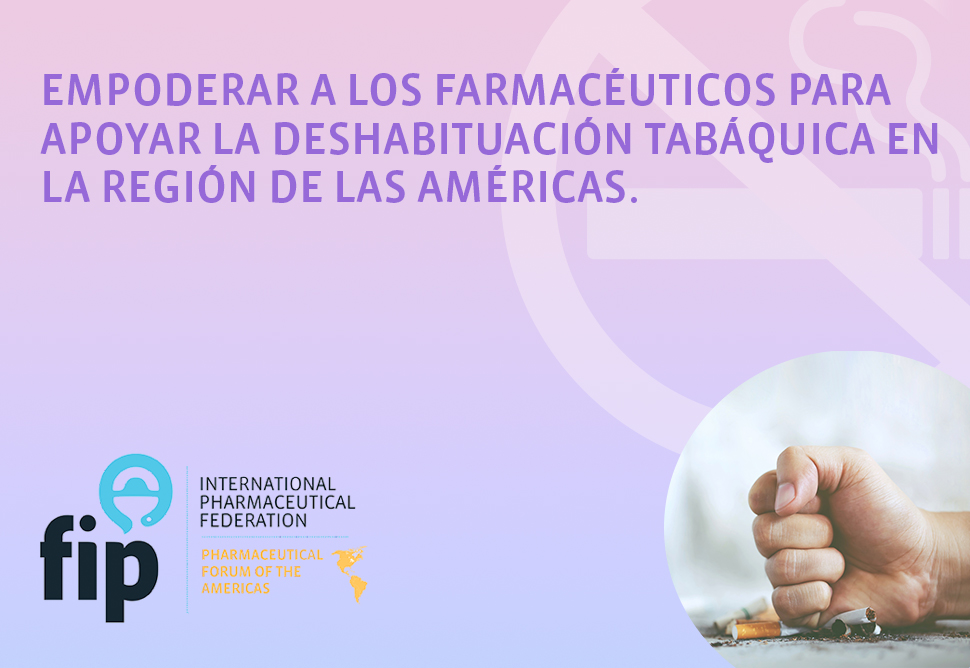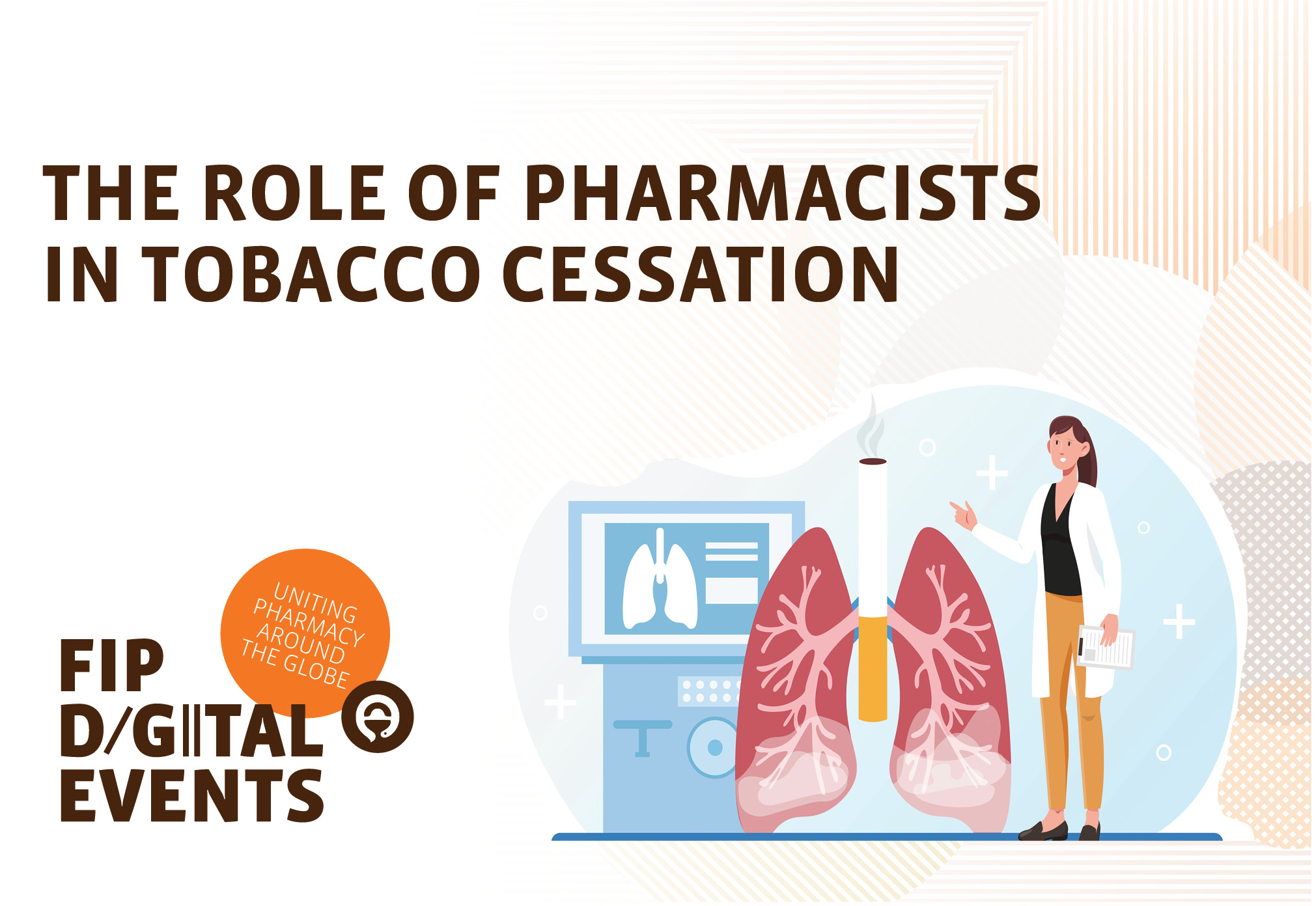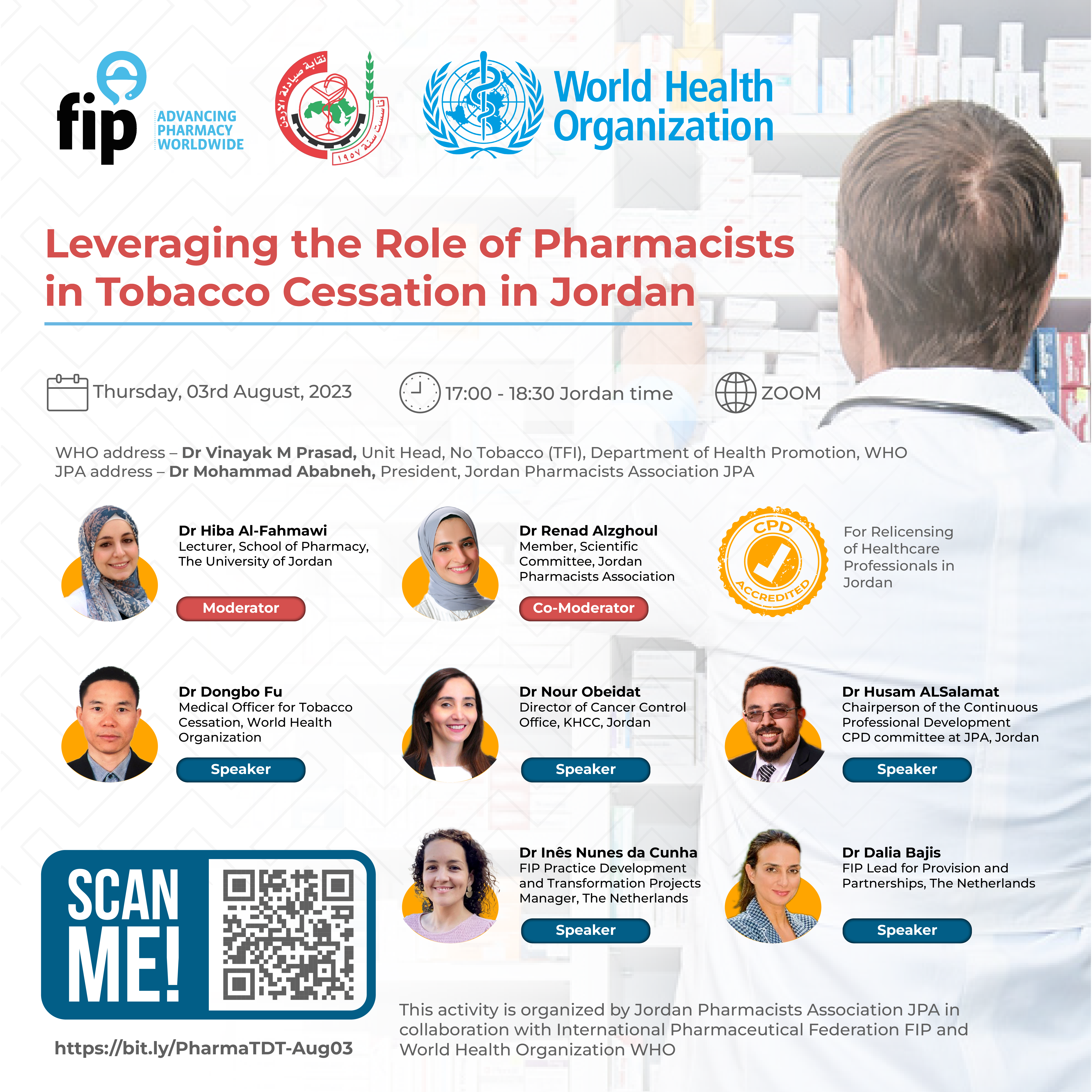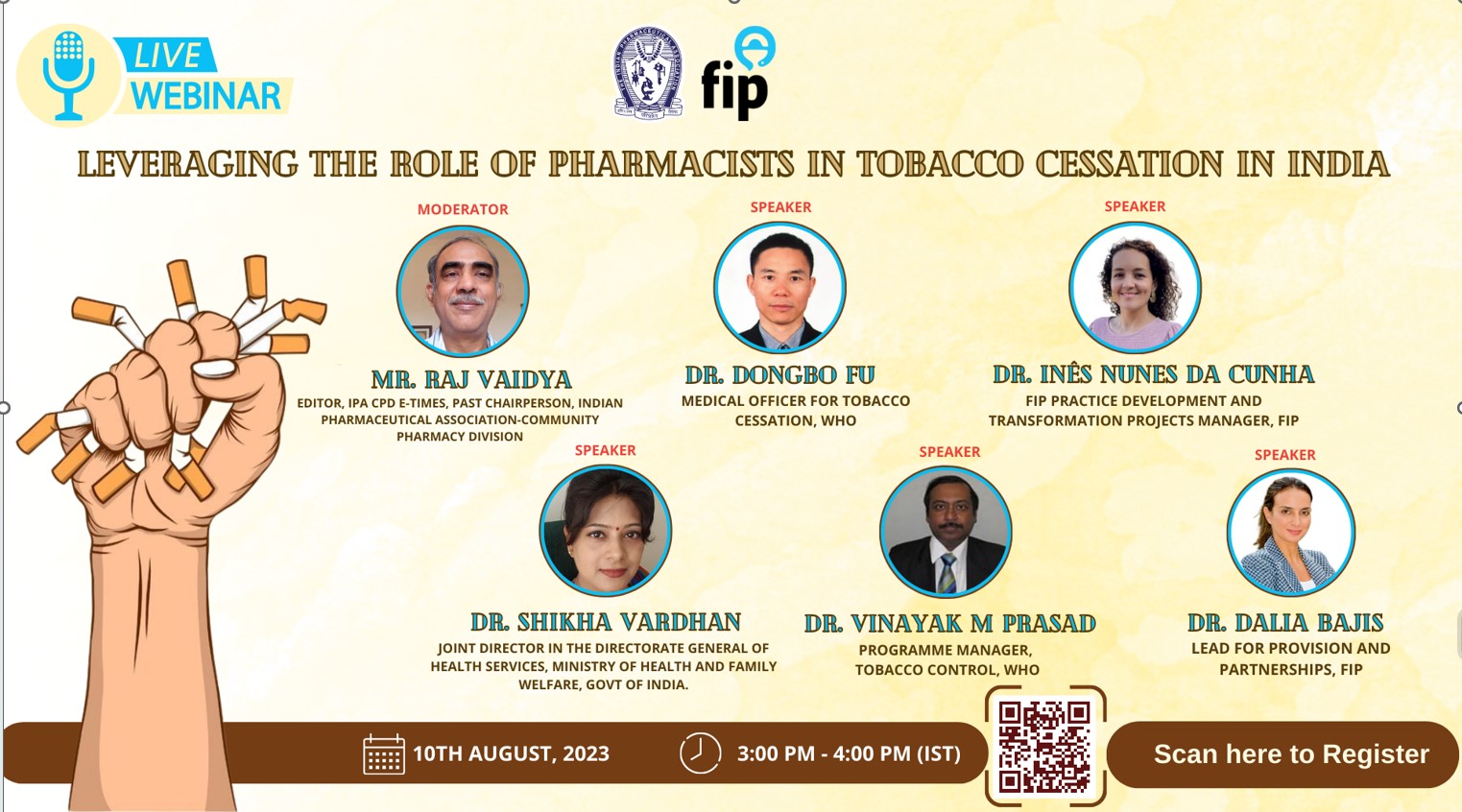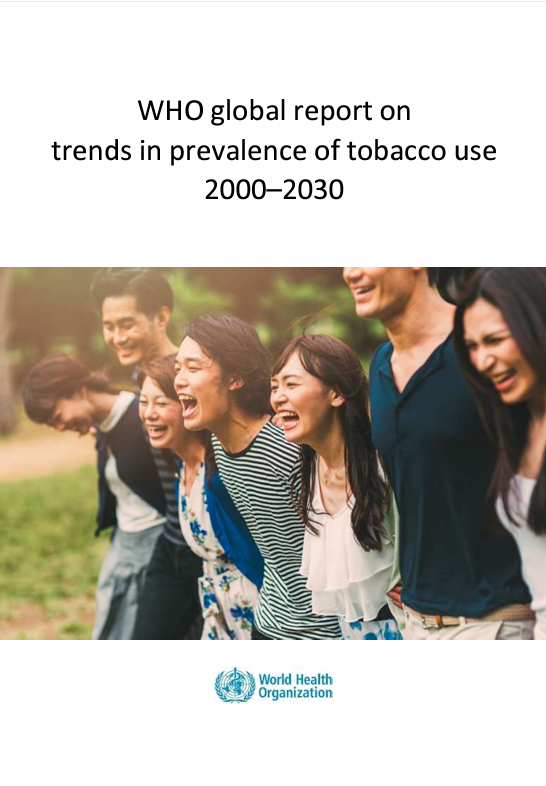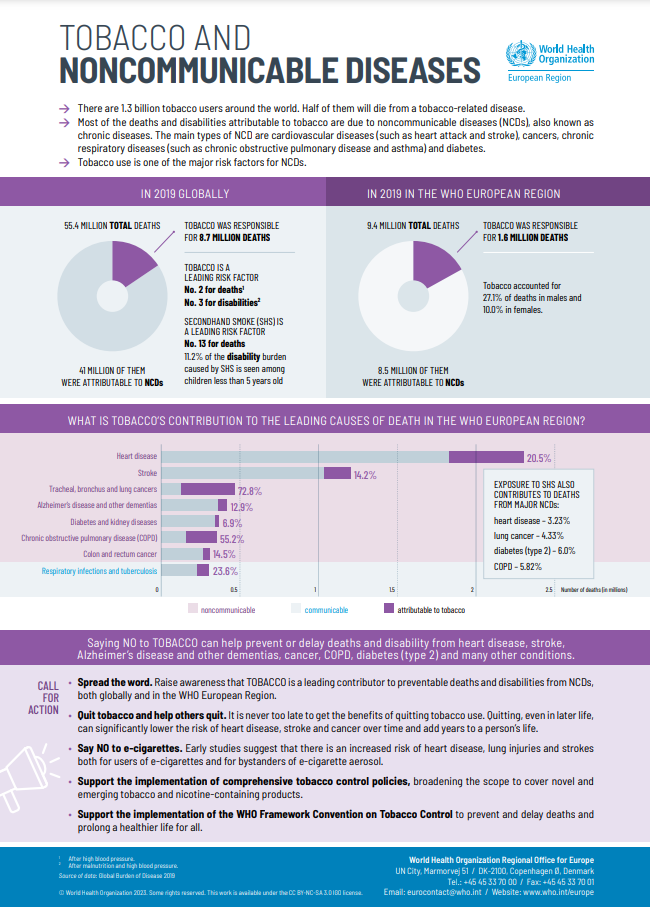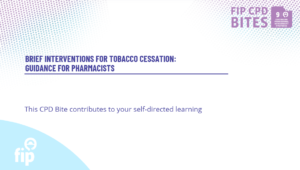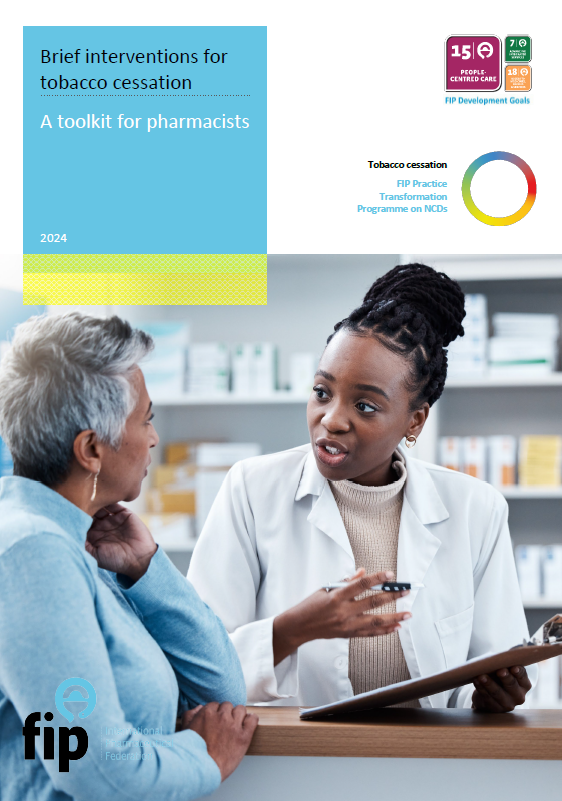
Brief interventions for tobacco cessation: A toolkit for pharmacists (2024)
Brief interventions are recognised by the WHO as one of the effective measures to help people quit tobacco use. This toolkit describes intervention (advice) models for “very brief advice”, for people who are ready to quit tobacco use (the 5As model), and for those who are not ready to quit (the 5Rs model). These are the latest evidence-based practices and techniques that pharmacists can use to help people break their addiction. Pharmacists are encouraged to integrate tobacco cessation brief interventions into their routine practice, ensuring that tobacco cessation services are part of broader healthcare efforts to combat non-communicable diseases. By equipping pharmacists with the knowledge and skills needed to provide effective tobacco brief interventions, this toolkit serves as a vital resource for improving the health and well-being of communities worldwide, and for alleviating the burden of tobacco-related diseases on healthcare systems.
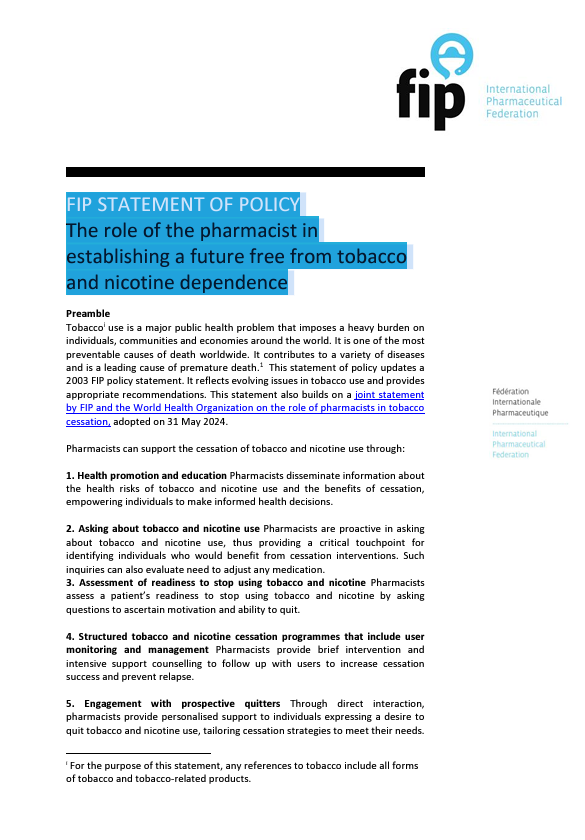
FIP STATEMENT OF POLICY – The role of the pharmacist in establishing a future free from tobacco and nicotine dependence
Pharmacists have a crucial role to play in tobacco and nicotine use cessation in order to reduce the heavy burden of non-communicable diseases. This policy statement, adopted by the FIP Council in September 2024, makes recommendations for pharmacists, pharmaceutical organisations, pharmacy educators, governments, policy makers, regulatory agencies and healthcare funders to facilitate and support roles for the pharmacy profession in supporting the cessation of tobacco and nicotine use. It updates the 2003 FIP policy statement and builds on a joint statement by FIP and the World Health Organization which was adopted in May 2024.
Through the updated policy statement, FIP urges pharmaceutical organisations to actively support tobacco cessation services in pharmacies by developing guidelines and implementation tools. Pharmacists should take a more active role preventing people from ever starting tobacco use and are encouraged to utilise digital technologies to increase the uptake of effective cessation treatments. Educational institutions should incorporate knowledge on tobacco use prevention and cessation into their curricula and competency frameworks, while governments and policymakers are called on ensure remuneration for cessation services.

Joint WHO-FIP statement on the role of pharmacists in tobacco cessation
The International Pharmaceutical Federation (FIP) and the World Health Organization (WHO) are urging national tobacco control programmes and pharmacy associations to develop and implement plans to engage more pharmacists in advancing tobacco cessation. A joint statement, issued by the two organisations on World No Tobacco Day 2024, describes a number of ways in which tobacco control programmes and pharmacy associations can work together towards this goal. These include: providing joint leadership in developing policy guidance and resource mobilisation, undertaking training of pharmacists to enable effective delivery of tobacco cessation services, and promoting rational use of proven over-the-counter and prescription tobacco cessation medicines.
The statement calls for pharmacists to adopt a sustainable and synergistic approach to tobacco cessation and nicotine dependence. It also emphasises the need for continuous innovation in enhancing the role of pharmacists to effectively respond to the public health challenges posed by tobacco.
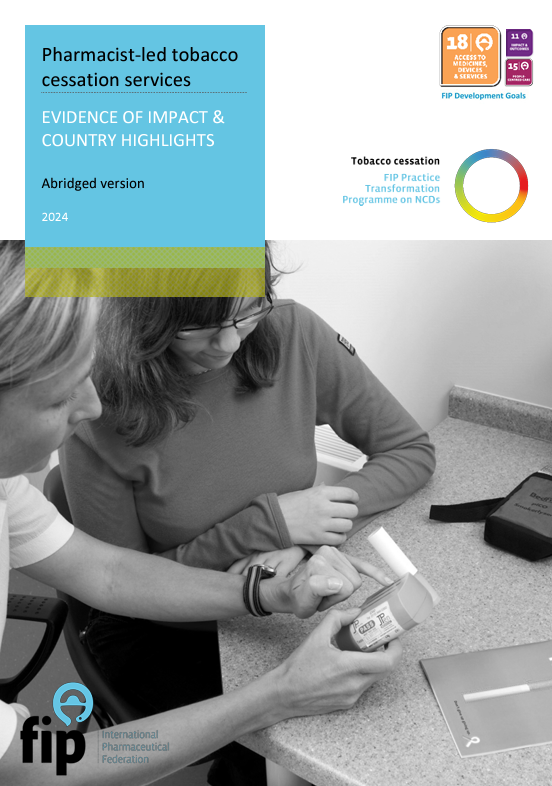
Pharmacist-led tobacco cessation services: Evidence of impact and country highlights (2024)
This report provides a comprehensive overview of the key role of pharmacists in tobacco cessation and how this contributes to timely patient care and to health system efficiency through interprofessional care teams. The report also shares global best practices to advance pharmacy practice and international standards of patient care. The basis for this report was established through a review of existing literature. In addition, a survey and a compilation of brief country highlights specifically tailored to engage FIP member organisations (MOs) were conducted. The full survey results are available to FIP member organisations in an extended version of this report. However, a summary of the findings is provided here too.
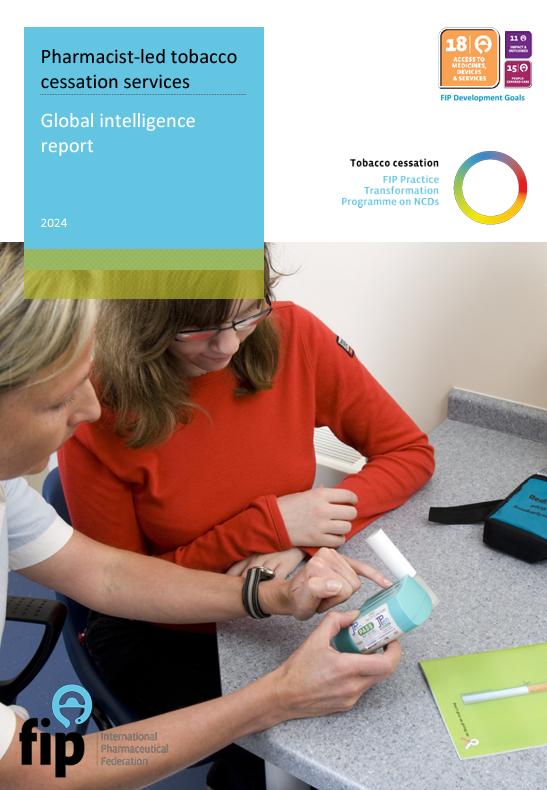
Pharmacist-led tobacco cessation services: Global intelligence report (2024)
This report provides a comprehensive overview of the key role of pharmacists in tobacco cessation and how this contributes to timely patient care and to health system efficiency through interprofessional care teams. The report also shares global best practices to advance pharmacy practice and international standards of patient care.
The basis for this report was established through a review of existing literature. In addition, a survey and a compilation of brief country highlights specifically tailored to engage FIP member organisations (MOs) were conducted. Our literature review suggests that tobacco cessation services or interventions provided by pharmacists are strongly correlated with health outcomes, economic savings, increased health system efficiency and reduced burden on other healthcare sectors through interprofessional collaborations. It also identified barriers that prevent the implementation of tobacco cessation services by pharmacists.
Collated evidence from 51 countries and territories and 36 country highlights have identified the range of services currently provided in different countries/regions, explain the scope of tobacco cessation service models or interventions available, explain the remuneration models available and reinforce the valuable role of pharmacists in providing these services/interventions.
The data collected indicate that while most countries support the implementation of tobacco cessation services, the scope of professional standards and policies, the remuneration frameworks and the public advocacy of the role of pharmacists in tobacco cessation varies greatly amongst countries. In addition, the data highlight the challenges faced by pharmacists in attempts to implement tobacco cessation services and demonstrate that there is a need for pharmacists to be thoroughly equipped with appropriate knowledge and skills to be competent tobacco cessation support providers. Further, it is important to strengthen the referral pathways by acknowledging the extended roles of the pharmacist in tobacco cessation initiatives. This will go a long way in fostering interprofessional collaborations between pharmacists and other members of the primary healthcare team.
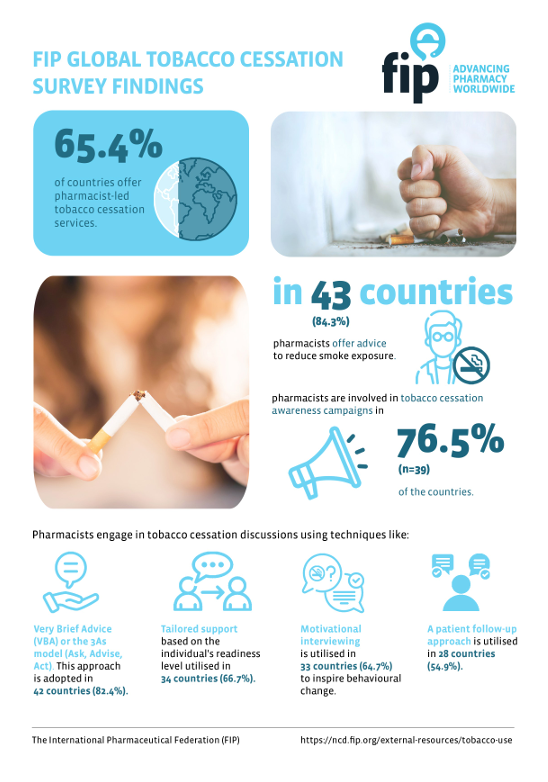
FIP Global tobacco cessation survey findings – Infographic
This infographic summarises the results of FIP’s global tobacco cessation survey, which are included in the FIP publication Pharmacist-led tobacco cessation services: Global intelligence report (2024).
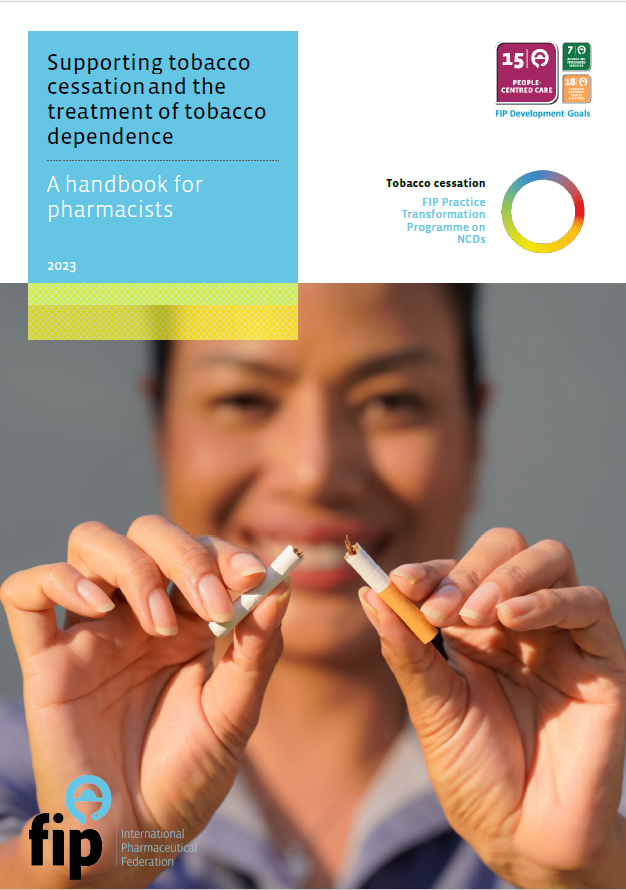
Supporting tobacco cessation and the treatment of tobacco dependence: A handbook for pharmacists (2023)
This handbook has been developed as a comprehensive and practical resource for pharmacists to support individuals in their efforts to quit tobacco, emphasising the critical role of pharmacists in providing comprehensive and coordinated care to patients seeking to quit. It covers the latest evidence-based practices, techniques and strategies to help our patients quit and not start again. The information contained in this handbook is practicable and tailored to the needs of pharmacists working in the field. By using the information and strategies outlined in the handbook, pharmacists can contribute to improving public health and reducing the burden of tobacco use on healthcare systems.
This publication is available in the following languages:
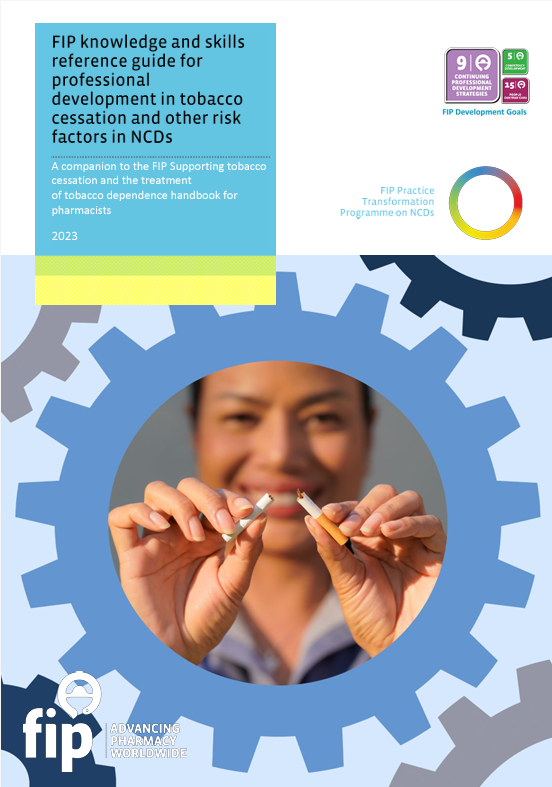
FIP knowledge and skills reference guide for professional development in tobacco cessation and other risk factors in NCDs: A companion to the FIP Supporting tobacco cessation and the treatment of tobacco dependence: A handbook for pharmacists (2023)
The “Supporting tobacco cessation and the treatment of tobacco dependence: A handbook for pharmacists” is accompanied by a publication describing the knowledge and skills required for the delivery of pharmacist-led interventions to support tobacco cessation in addition to other modifiable NCD risk factors such as physical inactivity, unhealthy diet, and harmful use of alcohol.
This publication is available in the following languages:
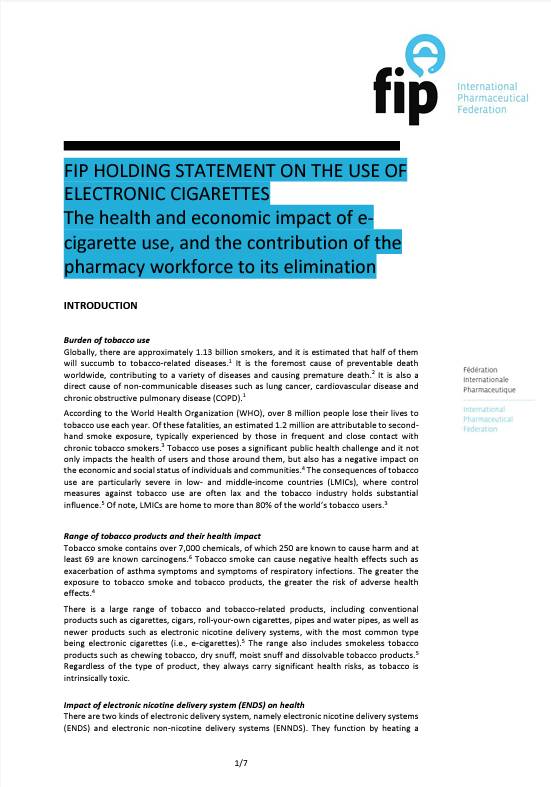
FIP HOLDING STATEMENT ON THE USE OF ELECTRONIC CIGARETTES: The health and economic impact of e-cigarette use, and the contribution of the pharmacy workforce to its elimination (2023)
In light of the increasing use of e-cigarettes, particularly among young people, and concerns around the safety of these products, the FIP Bureau has issued a Holding Statement on the health and economic impact of e-cigarette use, and the contribution of the pharmacy workforce to its elimination.
The statement has been developed by FIP staff and the co-chairs of FIP’s policy committee on tobacco cessation, in collaboration with Bureau members and in consultation with the World Health Organization (WHO).
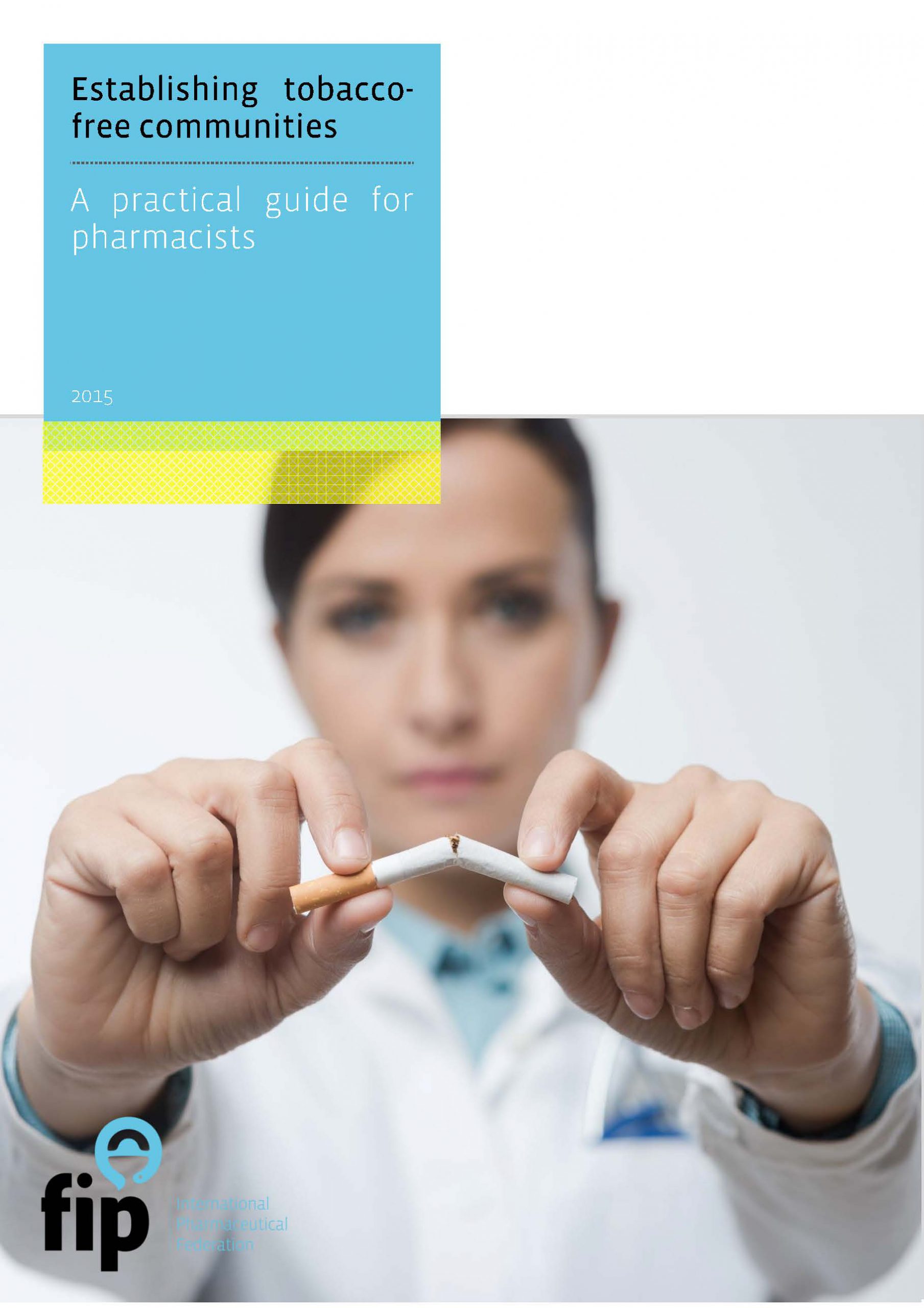
Establishing tobacco-free communities: A practical guide for pharmacists (2015)
This briefing document presents an overview of the different tobacco cessation activities pharmacists are involved in, and aims to support pharmacists to take an even more prominent role during the World No Tobacco Day, which is devoted to the international fight against tobacco.
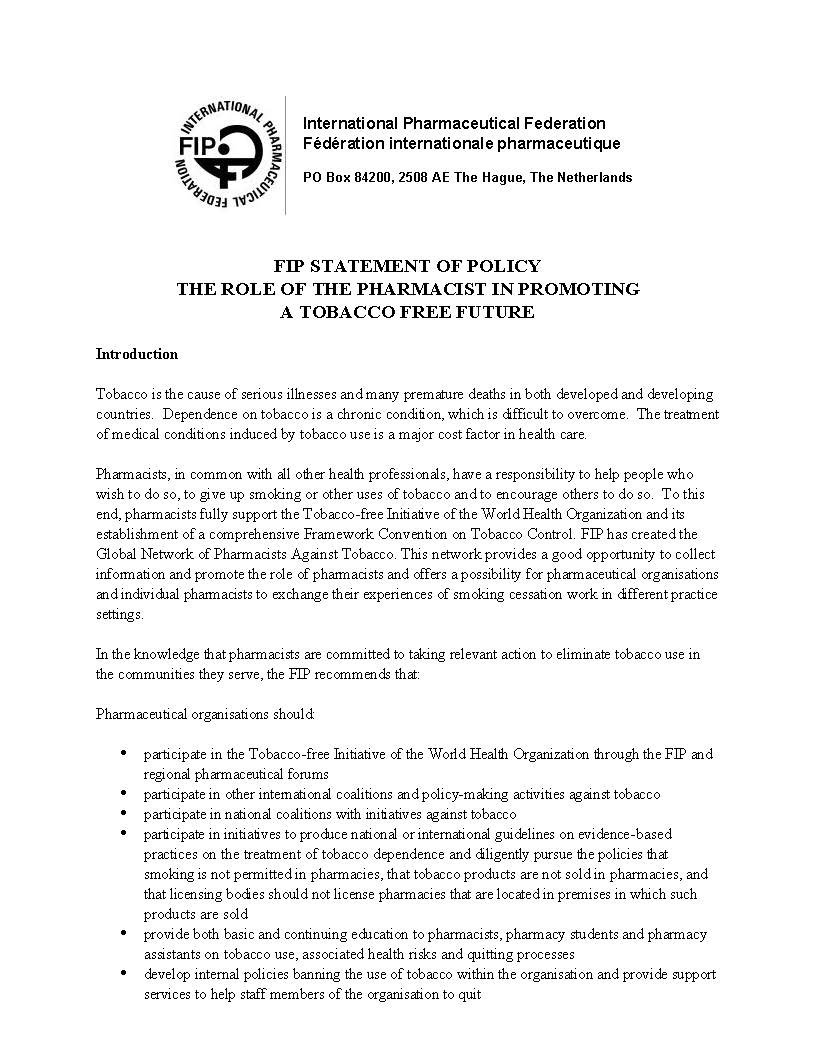
The Role of the Pharmacist in Promoting a Future Free of Tobacco (2003)
This statement supports and advocates for pharmacists to take relevant action to eliminate tobacco use in the communities that they serve.



